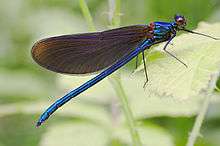Calopteryx (damselfly)
| Calopteryx | |
|---|---|
 | |
| Calopteryx virgo | |
| Scientific classification | |
| Kingdom: | Animalia |
| Phylum: | Arthropoda |
| Class: | Insecta |
| Order: | Odonata |
| Family: | Calopterygidae |
| Genus: | Calopteryx Leach, 1815 |
| Synonyms | |
|
Agrion | |
Calopteryx is a genus of large damselflies belonging to the family Calopterygidae. The colourful males often have coloured wings whereas the more muted females usually have clear wings although some develop male (androchrome) wing characteristics. In both sexes, there is no pterostigma.[1]
Species
The genus contains the following species:[2][3]
- Calopteryx aequabilis Say, 1839 – River Jewelwing[4]
- Calopteryx amata Hagen, 1889 – Superb Jewelwing[4]
- Calopteryx angustipennis (Hagen in Selys, 1853) – Appalachian Jewelwing[4]
- Calopteryx balcanica Fudakowsky, 1930
- Calopteryx coomani (Fraser, 1935)
- Calopteryx cornelia Selys, 1853
- Calopteryx dimidiata (Burmeister, 1839) – Sparkling Jewelwing[4]
- Calopteryx exul Selys, 1853 – Glittering Demoiselle[5]
- Calopteryx haemorrhoidalis (van der Linden, 1825) – Copper Demoiselle[6]
- Calopteryx hyalina Martin, 1909 – Clear-winged Demoiselle[5]
- Calopteryx intermedia Selys, 1887
- Calopteryx japonica Selys, 1869
- Calopteryx laosica Fraser, 1933
- Calopteryx maculata (Palisot de Beauvois, 1805) – Ebony Jewelwing[4]
- Calopteryx melli Ris, 1912
- Calopteryx mingrelica Selys, 1869
- Calopteryx oberthuri McLachlan, 1894
- Calopteryx orientalis Selys, 1887
- Calopteryx samarcandica Bartenev, 1912
- Calopteryx splendens (Harris, 1780) – Banded Demoiselle,[7] Banded Agrion,[8] Banded Jewelwing[9]
- Calopteryx syriaca (Rambur, 1842) – Syrian Demoiselle[5]
- Calopteryx taurica Selys, 1853
- Calopteryx transcaspica Bartenev, 1912
- Calopteryx virgo (Linnaeus, 1758) – Beautiful Demoiselle,[7] Beautiful Jewelwing[9]
- Calopteryx waterstoni Schneider, 1984
- Calopteryx xanthostoma (Charpentier, 1825) – Western Demoiselle[6]
References
| Wikispecies has information related to: Calopteryx |
| Wikimedia Commons has media related to Calopteryx. |
- ↑ Dijkstra, Klaas-Douwe B. (2006). Field Guide to the Dragonflies of Britain and Europe. p. 65. ISBN 0-9531399-4-8.
- ↑ Martin Schorr; Martin Lindeboom; Dennis Paulson. "World Odonata List". University of Puget Sound. Retrieved 11 August 2010.
- ↑ Lam, Ed. Damselflies of the Northeast. Forest Hills, NY:Biodiversity Press, 2004.
- 1 2 3 4 5 "North American Odonata". University of Puget Sound. 2009. Retrieved 5 August 2010.
- 1 2 3 The Status and Distribution of Dragonflies of the Mediterranean Basin. IUCN. 2009. ISBN 2-8317-1161-4.
- 1 2 "Checklist, English common names". DragonflyPix.com. Archived from the original on 8 February 2011. Retrieved 5 August 2010.
- 1 2 "Checklist of UK Species". British Dragonfly Society. Retrieved 5 August 2010.
- ↑ Manning, Stanley Arthur (1974). The naturalist in south-east England: Kent, Surrey and Sussex. David & Charles. p. 164.
- 1 2 Brian Nelson; Robert Thompson (2004). The Natural History of Ireland's Dragonflies. Ulster Museum. ISBN 978-0-900761-45-4.
This article is issued from Wikipedia - version of the 11/13/2016. The text is available under the Creative Commons Attribution/Share Alike but additional terms may apply for the media files.